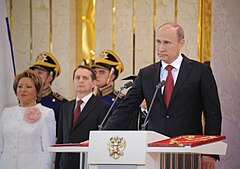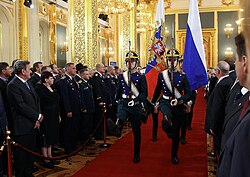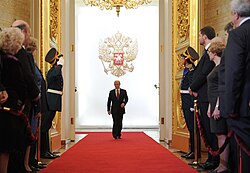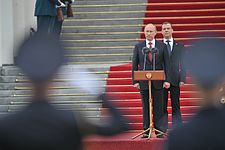Dear citizens of Russia! Dear friends!
Introduction of the elected President in a post - it is always the beginning of a new stage in the life of Russia, in its history. The President is the Head of State, the guarantor of the Constitution, rights and freedoms of man and citizen, determines the main directions of domestic and foreign policy.
The sequence of state policy – a prerequisite for moving forward in Russia. It is important that large-scale transformations, which we conducted in previous years in the economic, social and political spheres, have been further developed. The only way we will build a strong democratic state where the rule of law and social justice, where security is provided, where all opportunities for self-realization, his business, civic and artistic initiatives.
These problems have been a priority for me as President. I have worked as promised, taking the oath of office: openly and honestly in the interests of the people doing everything to ensure that they are free and confident about the future.
We managed a lot - even in a difficult period of the global crisis. We fully fulfilled our social responsibilities, in fact - do the modernization of the economy. Of course, not everything turned out, not all plans failed to realize until the end, but this work should be continued. I am absolutely sure.
Together we went through serious trials: Russian safety tested, as before, to the test. We had to repel an aggressor. And we continue the fight against terrorism, which remains a threat to our country
I think one of the important achievements, the obvious achievements, the broad participation of citizens in political life. It is crucial that the government itself has become more open to dialogue and cooperation. The government in fact can not work effectively without feedback from the people, without taking into account the initiatives that are born in a society. In my work I have been guided by this. After all, all of us share a commitment to the common good, for freedom and progress. And of course, we share a love for children and for our country - Russia.
Completing the job as head of state, I want to thank everyone who supported me all these years. Thank you for the great confidence you have given me, for your help, for your compassion. For the fact that we were together.
I would also like to thank all the citizens of Russia. Thank you! We still have much to do.
Heading the Russian state, to work for our people - it is a great responsibility and a great honor. And I am glad that the President will be Vladimir Vladimirovich Putin - an experienced person and a strong leader, who is backed by the majority of citizens of our country.
I wish you success, Vladimir Vladimirovich Putin as President of Russia, in his work for our country, for our people!









